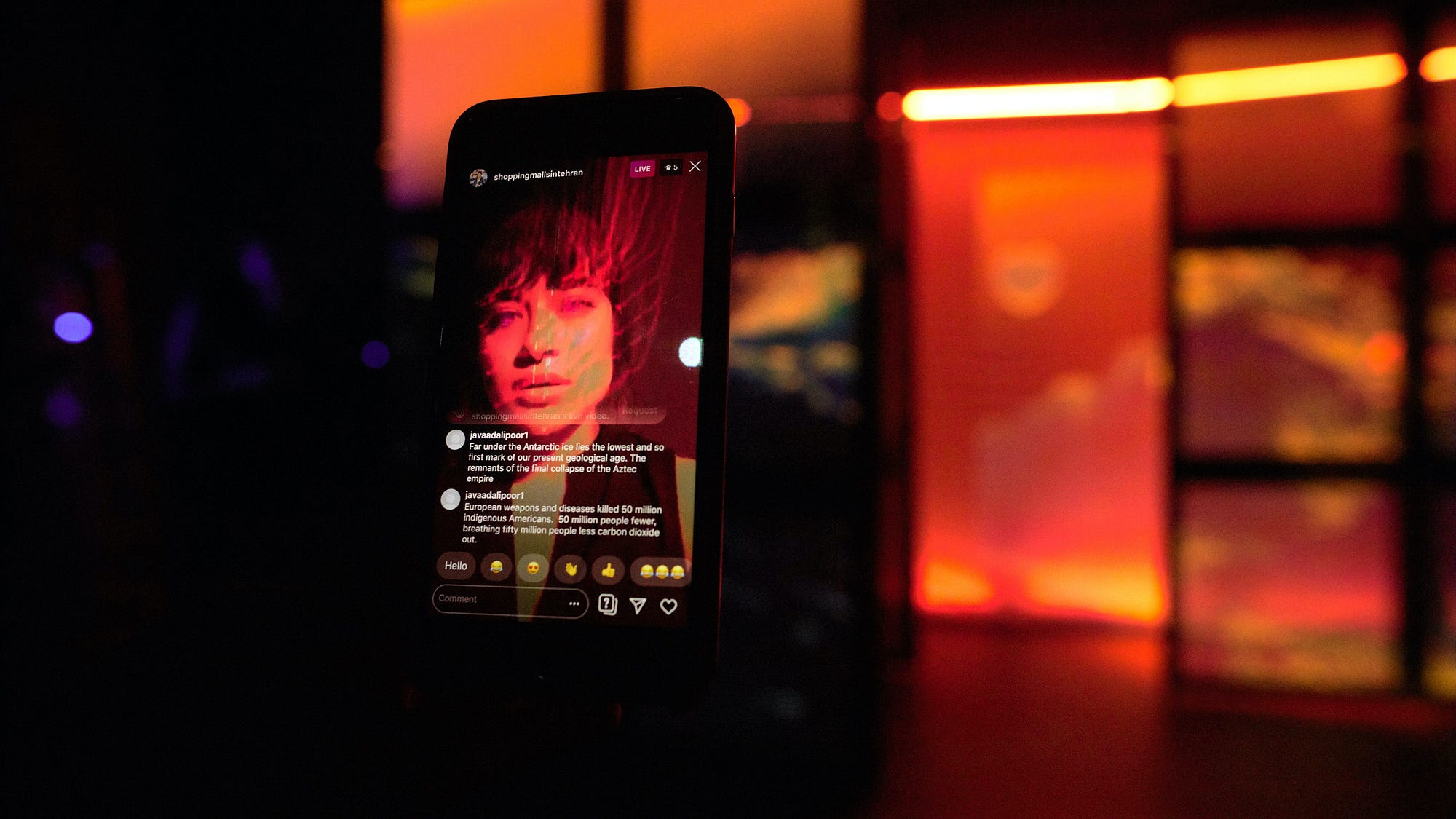
Part of our Sundance New Frontier 2021 coverage.
What do the deaths of two rich club kids in Tehran have to do with global warming?
Well, a bit of everything really, as Javaad Alipoor and Kirsty Housley make the case in Rich Kids: A History of Shopping Malls in Tehran.
It is a stunning bit of docu-narrative that refuses to limit itself to a singular medium.
This is a story about two young Iranians whose Instagram feeds went viral in 2015 after they died in a car cash. Parivash Akbarzadeh was driving her boyfriend’s yellow Porche Boxster at 120 mph with him in the passenger seat. Mohammad Hossien Rabbani-Shirazi was “the son of a prominent Ayatollah and the grandson of a revolutionary hero,” whose father’s position allowed the family to avoid the worst of the economic sanctions that crippled the country. They were both part of a culture which is best exemplified in the #RichKidsofTehran hashtag on Instagram. Here you can see images of conspicuous consumption by the scions of families in the Revolutionary Gaurd, living it up even while sanctions crush the livelihoods of the ordinary people of Tehran. And while the dialog — masterfully written — is imagined the life and death of Parivash and Mohammad is oh so very real.
Rich Kids… acts as a kind of archeological exploration of the lives of the couple, stretching backwards through time from the moment of the fatal car crash in the same way that an Instagram feed does. You’re literally stretching backwards through time, as the story is narrated by writer Alipoor and actress Peyvand Sadeghian, as they guide you down and back through the Instagram feed created for the show.
Get Noah J Nelson’s stories in your inbox
Join Medium for free to get updates from this writer.
SubscribeSubscribe
In a way, this is hypertext performance art, which takes the spirit of an Adam Curtis documentary or James Burke’s Connections and anchors it firmly in an all-too-human tale of excess and youthful rebellion, nestled inside a culture whose income inequality is easy to see if only because we have become largely blinded to that within our own.
As we move backwards through time in the lives of Parivash and Mohammad, their personalities—as imagined by Alipoor—gain depth and marks of personal tragedy. The couple isn’t supposed to be together: he’s engaged to someone else; her family doesn’t approve of the relationship. Both of them are wrapped up firmly in a scene that embraces the decadence of Western consumer culture, right down to the selfies filled with expensive watches and illicit booze.
Yet these elements are not left alone to be mere set decoration. They are portals into the currents of the world as a whole, where a version of this story plays out on every continent. Here, form follows content, as Alipoor or Sadeghian instructs us to jump into an Instagram hashtag to witness how rich kids around the world present themselves (spoiler: it’s the same as in Tehran) or into the aesthetic of malls in the ‘90s.
While this all sounds like it is heady or academic, the delivery instead feels like an exciting late night Wikipedia dive, as each element opens a door to a larger world. The dopamine rush of mental connection is as potent a drug as the lines of cocaine which fuel the all night dance parties of our doomed lovers’ lives. It’s at once as familiar as a school film strip and as gloriously discomforting as a late night dorm room conversation with the smartest kid in your school. All of it is pulling back, back, towards something essential in human culture, before pulling the rug out from underneath received wisdom as a whole.
Rich Kids… is one of those rare works that leaves you with more questions than answers. This is to its credit and not its detriment. While the story of Parivash and Mohammad is crystal clear by the time we come to the end of the feeds, the world itself seems lit anew from fresh angles, with the intricacies of history (I didn’t even get into how climate change or the Aztecs factor in) animated by new energy and insights.
Rich Kids: A History of Shopping Malls in Tehran plays again on January 31 and February 2 as part of the Sundance Film Festival’s New Frontier programming (Explorer Passes are still available at $25), and was part of the Under The Radar festival at The Public in NYC.
Discover the latest immersive events, festivals, workshops, and more at our new site EVERYTHING IMMERSIVE, new home of NoPro’s show listings.
NoPro is a labor of love made possible by our generous Patreon backers. Join them today!
In addition to the No Proscenium web site, our podcast, and our newsletters, you can find NoPro on Twitter, Facebook, YouTube, Instagram, in the Facebook community Everything Immersive, and on our Slack forum.




















Discussion